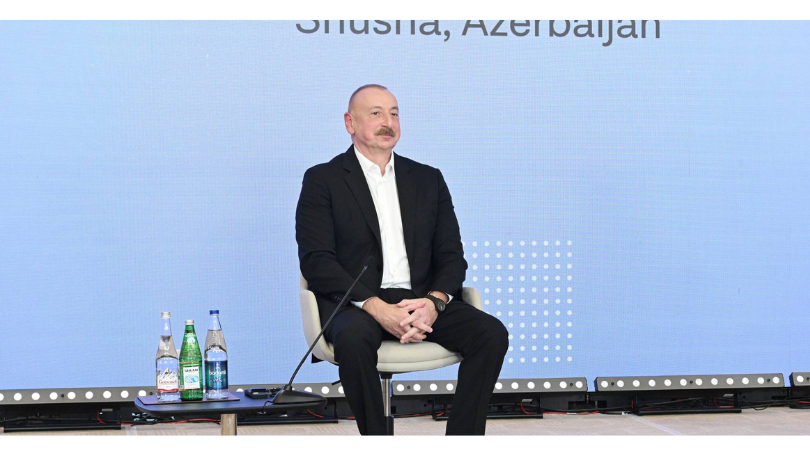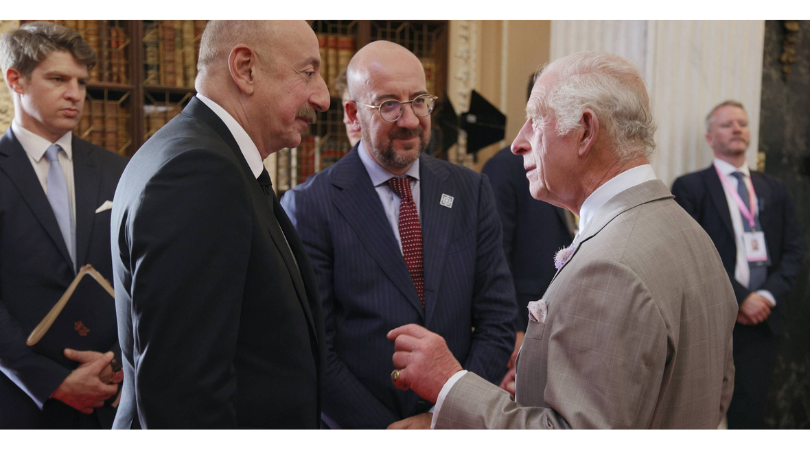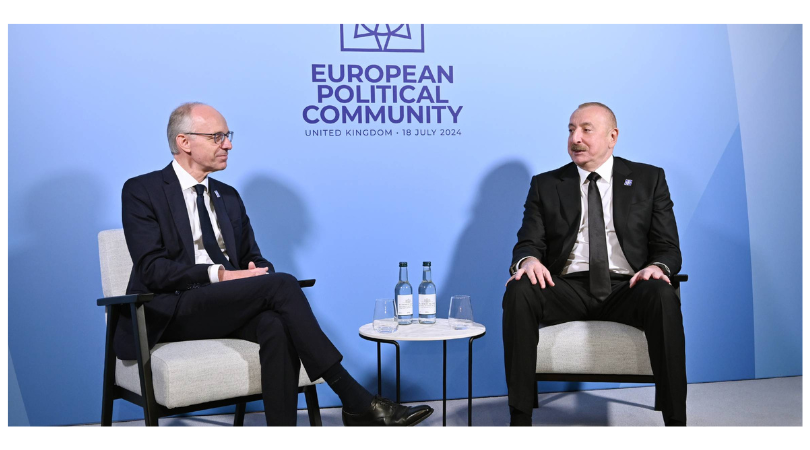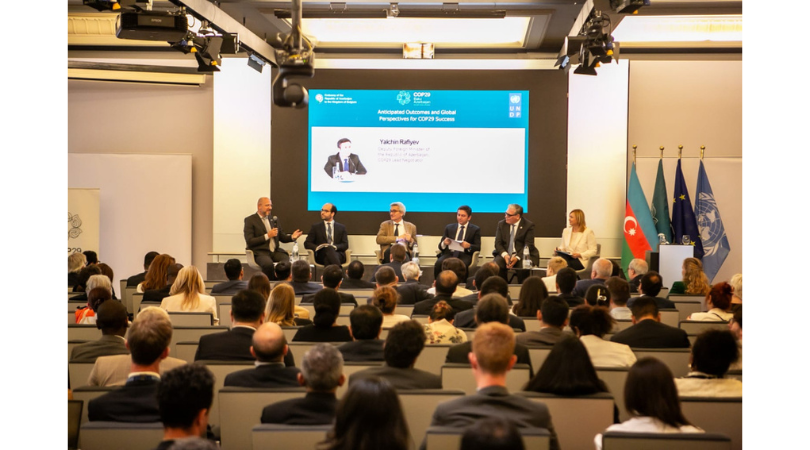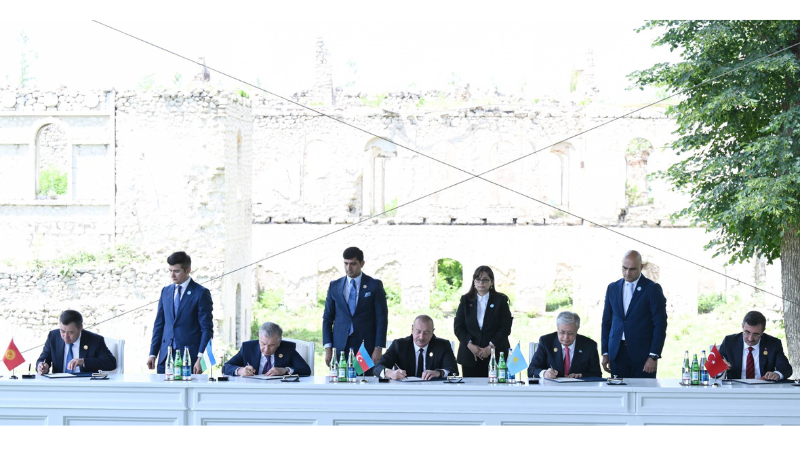Statement by the Minister of Foreign Affairs of the Republic of Azerbaijan
Statement by the Minister of Foreign Affairs of the Republic of Azerbaijan
Eastern Partnership Foreign Ministers' meeting
Brussels
12 December 2022
High Representative Josep Borrell,
Commissioner Oliver Varhelyi,
Distinguished colleagues,
At the outset, I express my gratitude for convening this ministerial meeting. This meeting is a useful opportunity for open and sincere exchange of views regarding the current state and future direction of the Eastern Partnership.
Eastern Partnership is based on shared ownership and responsibility of all parties involved. This should continue to guide our work regarding the future evolution of this initiative.
Azerbaijan continues to see the Eastern Partnership as an important complementary mechanism for the development of bilateral EU-Azerbaijan relations, which is based on mutual respect, equal partnership, shared interests and benefits.
EU is our largest trade and investment partner. EU-Azerbaijan MoU signed in July 2022 will be important both in terms of stable and affordable natural gas supply and potential export of green electricity to Europe. Next week we will observe the launch of Azerbaijan-Georgia-Romania-Hungary Black Sea submarine cable Project, which will accelerate energy transition in the participating states. We are also working with our partners on the export of green energy from Azerbaijan to Europe and expect to take an important step in the coming days.
Azerbaijan and EU also work on implementation of the EU’s Economic and Investment Plan in Azerbaijan and this is a good example of project-oriented cooperation. First meeting of the High Level Joint Working Group was held last week in Baku.
Negotiations are ongoing for new bilateral agreement between the EU and Azerbaijan, and today our teams will engage in another round of negotiations.
In the context of transport and connectivity links in the region I would like to note the wide economic and investment possibilities of the Trans-Caspian East-West Middle Corridor and increase of transit flows via Azerbaijan by 70% in 2022. The emerging transport hub in the liberated territories of Azerbaijan, including the Zangazur Corridor will play its positive role for regional peace and sustainability, and will foster intra-regional trade.
Dear colleagues,
Azerbaijan has embarked on large-scale post-conflict rehabilitation, reconstruction and reintegration efforts. In 2023 1.8 billion USD will be allocated from State budget for this purpose.
This year the first group of displaced persons have already been resettled in the newly built Aghali village marking the practical start of the “Great Return” program, which targets around seven hundreds thousands displaced Azerbaijanis.
Azerbaijan is also resolute to re-integrate its citizens of Armenian origin residing in post-conflict territories, guaranteeing the same rights and freedoms with all the citizens of Azerbaijan. The Constitution of the Republic of Azerbaijan provides the solid legal framework in this regard. Increased dialogue and contacts between central Azerbaijani authorities and local ethnic Armenian residents aim at ensuring peaceful co-existence and needs to be encouraged and sustained.
Massive contamination of territories of Azerbaijan with land mines and other explosives is a key challenge for post-conflict rehabilitation and reconstruction. Azerbaijan appreciates EU support for humanitarian demining. Yet, given the scale and gravity of the challenge greater international solidarity and support are of vital importance.
Since the signing of 10 November 2020 Trilateral Statement, 268 Azerbaijanis have been victims of mine explosions, 45 were killed and 223 wounded among them 9 children and youth, 1 woman, 3 media representatives.
By recklessly disregarding the rising humanitarian toll on almost daily basis, Armenia refuses to share full and accurate information on minefields. On the contrary, it plants new landmines at massive scale in the territory of Azerbaijan.
Since August this year, 2728 2021-Armenia-production anti-personnel landmines have been detected in the sovereign territories of Azerbaijan. The minefield of newly planted Armenia-produced mines was already checked by the leadership of the Russian peacekeeping contingent and the Joint Russian-Turkish Monitoring Center, as well as military attaches of the embassies accredited in Azerbaijan.
Apart from being a breach of peace and war crime in itself, the continued planting landmines cannot but undermine efforts for reconciliation after almost 30-year-long bloody conflict.
The transfer of landmines to the territory of Azerbaijan is a blatant abuse of the Lachin road envisaged for exclusively humanitarian purposes.
Dear colleagues,
Despite devastating consequences and unhealed wounds of war and occupation, Azerbaijan offered Armenia peace based on mutual recognition and respect for each other’s sovereignty and territorial integrity within their state borders.
Over this year, facilitation by EU Council President Mr. Charles Michel provided momentum for post-conflict normalization. The trilateral meetings in Brussels proved to be productive. Azerbaijan continues to support this format and remains ready for further engagement.
Impartiality and neutrality, strict respect for international law and consent of the parties lie at the heart of any mediation or facilitation efforts, and these principles must be respected in all circumstances.
As one of the tangible outcomes of the Brussels meeting of 31 August, bilateral negotiations on the text of future peace treaty has started. Following the meeting with my Armenian counterpart in Washington on November 7, Azerbaijan has submitted the revised proposals to Armenia. Next round of negotiations is expected to be held in coming weeks.
Azerbaijan’s approach is clear, consistent, and is based on international law. This document shall guarantee their rights as two equal sovereign states and provide a basis for addressing all issues of common interest or concern falling into the realm of inter-state relations.
Despite increased dynamism in bilateral negotiations, the progress remains rather limited as Armenia sticks to past practice of imitation. Armenia tries to avoid implementing the undertaken obligations in all three major tracks of inter-state normalization, namely, signing a peace treaty, delimitation of borders and opening of regional communications.
Armenia has yet to fully withdraw its illegal armed formations from the territories of Azerbaijan. In a similar vein, Armenia artificially delays the restoration of transport links, including by rejecting to provide unimpeded access between mainland Azerbaijan and its Nakhchivan Autonomous Republic.
Instead, following reckless provocation along the undelimited state border in mid-September, Armenia has embarked on a smear campaign against Azerbaijan to hijack the normalization agenda.
The role of certain third parties to embolden Armenia’s revanchist behavior is also cause for serious concern, as it tempts Armenia to resort to increased military provocations and bellicose rhetoric.
Ladies and gentlemen,
Difficult times we are living through make it a necessity that EaP adapts and adjusts its activities to the needs and interests of partner states.
We hope that the EU`s approach towards the South Caucasus will be adapted taking into account new situation on the ground, emerging needs and priorities in the region.
Thank you.

